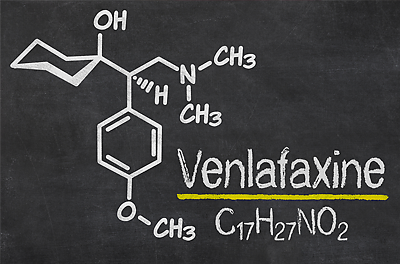Venlafaxine Found Comparable to Lithium for Bipolar II Maintenance Therapy
Abstract
There was no significant difference in emergence of major depression or hypomania found between venlafaxine and lithium, though venlafaxine did provide greater sustained response rate during six month follow-up.
The use of antidepressants for the treatment of bipolar disorder remains under debate due to concerns that over time antidepressants may induce episodes of mania. As a result, mood stabilizers such as lithium remain the recommended therapeutic choice by mental health organizations — including APA, as noted in their practice guidelines for bipolar disorder.

Venlafaxine showed a greater sustained response than lithium when used as maintenance therapy for bipolar disorder, in the first randomized double-blind study comparing the two.
However, there is a paucity of prospective data actually comparing the risks of mania or other long-term effects of antidepressants and mood stabilizers. (And the studies that have been completed enrolled mixed samples of bipolar I and II populations, who may respond differently to different medications.)
A study published online June 26 in the Journal of Affective Disorders compared long-term use of antidepressants with mood stabilizers specifically in patients with bipolar II disorder. This clinical study, carried out by researchers at the University of Pennsylvania Perelman School of Medicine, provides the first double-blinded comparison of these two treatment modalities and may allay the concerns regarding maintenance antidepressant use in patients with bipolar II disorder.
In this study, 129 adults with bipolar II depression were randomly selected to receive 12 weeks of antidepressant (venlafaxine) or mood stabilizer (lithium) therapy; patients who responded well to therapy were continued on the same medication for six additional months. At the end of the study, the two cohorts showed similar characteristics in relation to mania, with no incidents of hypomania in either group during the maintenance phase. While each group reported three cases of subclinical mania, there were no differences in the average duration of the manic episode.
Venlafaxine performed better for depression, achieving a greater sustained response rate during the maintenance phase than lithium. In addition, the emergence of any type of depression, major or minor, was more common in the lithium group (73.3 percent) than the venlafaxine group (37.5 percent). However, there was no significant difference in incident of major depression. Jay Amsterdam, M.D., head of the Depression Research Unit at the University of Pennsylvania Perelman School of Medicine and lead author of the study, believes the findings suggest that maintenance antidepressant therapy deserves more consideration as a treatment option for patients with bipolar II disorder. He acknowledged that the study has some statistical limitations, mostly because more participants responded to venlafaxine than lithium during the first 12 weeks of the study; only 15 lithium responders participated in the maintenance phase of the study compared with 40 participants who were taking venlafaxine.
“Still, even a conservative interpretation of these findings would suggest that antidepressant therapy is as effective as lithium in preventing episodes of depression or hypomania in people with bipolar II depression,” Amsterdam said.
“And if you factor in the better response rate during the first part of the study, people may be better off with antidepressants.”
While this work was limited to bipolar II patients, Amsterdam is also leading a study comparing the effects of lithium plus antidepressant versus lithium plus placebo as a maintenance therapy in bipolar I patients, which has just concluded.
The current study was funded by the National Institute of Mental Health. ■



